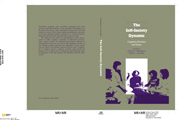Book contents
- Frontmatter
- Contents
- Contributors
- Preface and acknowledgments
- Introduction: The self–society dynamic
- 1 Exploring the relevance of social cognition for the relationship of self and society: Linking the cognitive perspective and identity theory
- 2 Toward a sociology of cognition
- 3 The cerebral self: Thinking and planning about identity-relevant activity
- 4 Growing up: The development and acquisition of social knowledge
- 5 The social contexts of self-feeling
- 6 Self-processes and emotional experiences
- 7 An affect control view of cognition and emotion
- 8 The self-concept as a basis for a theory of motivation
- 9 Attitudes, behavior, and the self
- 10 From changing selves toward changing society
- 11 Possible selves and social support: Social cognitive resources for coping and striving
- 12 Is the road to helping paved with good intentions? Or inertia?
- 13 Social structure and the moral self
- 14 The production of selves in personal relationships
- 15 Conclusion
- Indexes
Preface and acknowledgments
Published online by Cambridge University Press: 23 September 2009
- Frontmatter
- Contents
- Contributors
- Preface and acknowledgments
- Introduction: The self–society dynamic
- 1 Exploring the relevance of social cognition for the relationship of self and society: Linking the cognitive perspective and identity theory
- 2 Toward a sociology of cognition
- 3 The cerebral self: Thinking and planning about identity-relevant activity
- 4 Growing up: The development and acquisition of social knowledge
- 5 The social contexts of self-feeling
- 6 Self-processes and emotional experiences
- 7 An affect control view of cognition and emotion
- 8 The self-concept as a basis for a theory of motivation
- 9 Attitudes, behavior, and the self
- 10 From changing selves toward changing society
- 11 Possible selves and social support: Social cognitive resources for coping and striving
- 12 Is the road to helping paved with good intentions? Or inertia?
- 13 Social structure and the moral self
- 14 The production of selves in personal relationships
- 15 Conclusion
- Indexes
Summary
Manny Rosenberg observed, at a conference entitled “Self and Society: A Social Cognitive Approach,” convened at the University of Washington in July 1988, that this was the first gathering in the United States of sociological social psychologists who study the self, despite the fact that such work has been central to sociological social psychology for decades. This volume is one outgrowth of this conference. The participants included those who have developed and guided the growth of the original theory and research in this area – scholars such as Sheldon Stryker, Ralph Turner, and Morris Rosenberg – and a younger generation of scholars who have recently begun their work in this area.
The participants were asked to prepare papers on aspects of the relationship between self and society, and to address how theories of social cognition, a perspective that dominates contemporary psychological social psychology, might inform this relationship. The conference focused primarily on a question relevant to sociologists, that is, How can sociological social psychology benefit from considering recent work in social cognition? Had the papers focused only on the conference topic, the target audience would include primarily sociological social psychologists. However, reflecting the conviction of the authors that sociological approaches to the self–society interface have substantial merit, there is much here for psychological social psychologists to learn from as well. Virtually all of the chapters present new models, extend in creative ways existing research, or explore entirely new empirical territory.
- Type
- Chapter
- Information
- The Self-Society DynamicCognition, Emotion and Action, pp. xi - xiiPublisher: Cambridge University PressPrint publication year: 1991

